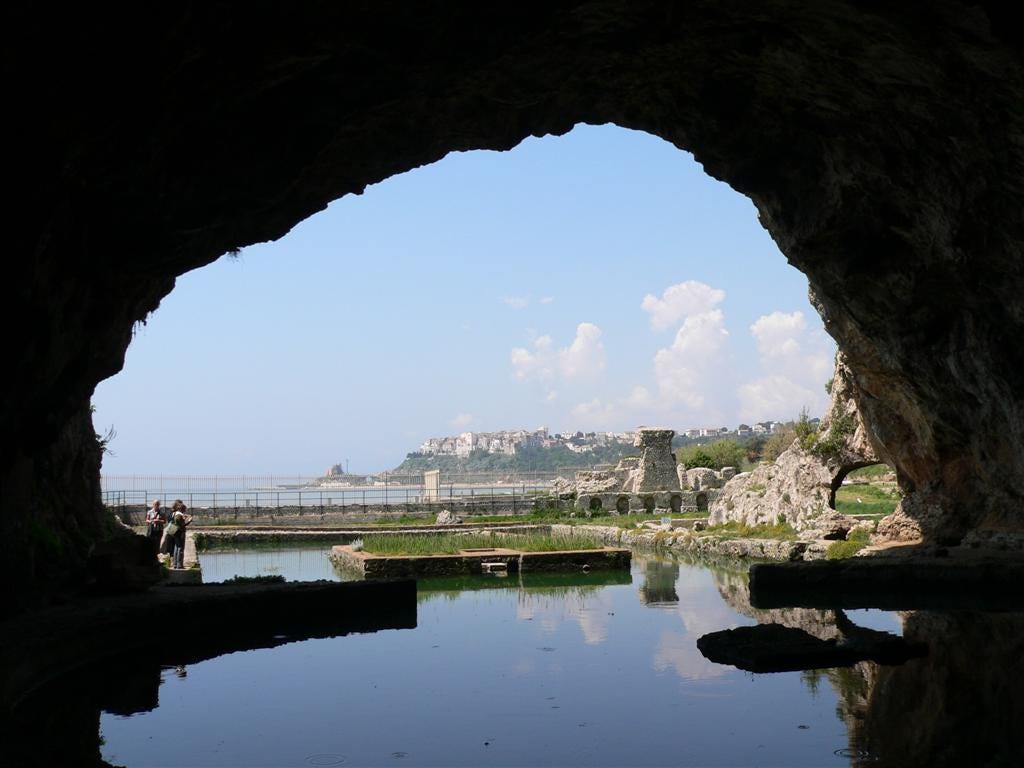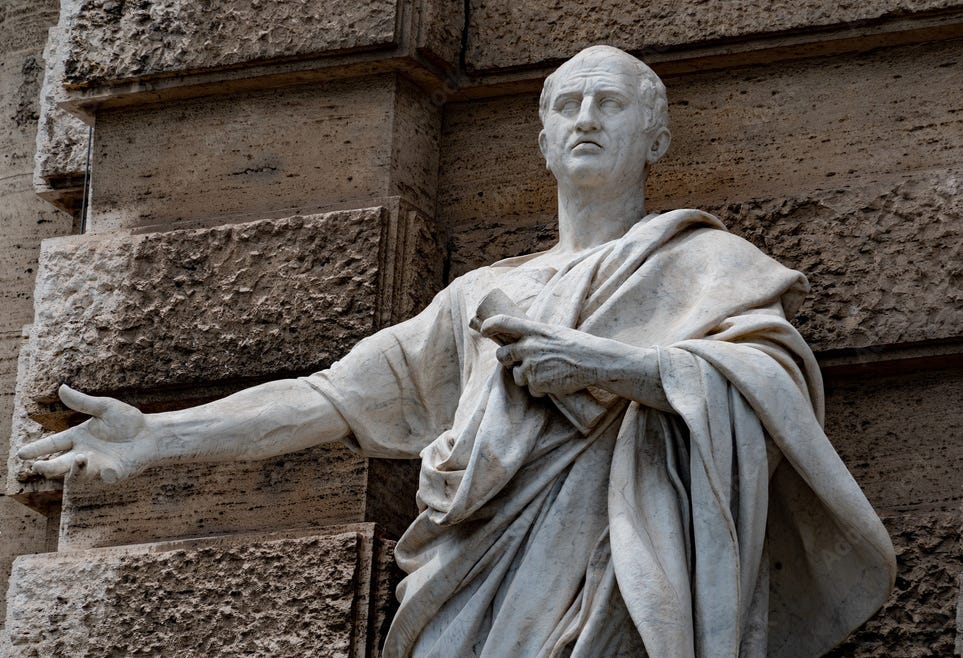Fishponds and Fighters
A lesson from Cicero on citizenship and duty
A peculiar Latin word appears in the writings of Marcus Tullius Cicero, one of the great philosophers and statesmen of the late Roman Republic — and an historical influence of mine.
Cicero’s word is PISCINARII. It means, roughly, “fishpond lovers” or alternatively “fish fanciers.” In the literal sense, the word means what you think it means: Piscinarii (singular Piscinarius) were people who built and kept fishponds (piscinae). Aquaculture was less an economic enterprise in the days of the Republic than it was a hobby, and often an extravagant one. The Roman author Varro noted, “For in the first place they are built at great cost, in the second place they are stocked at great cost, and in the third place they are kept up at great cost.”
For Cicero, the great orator and master of invective, the word piscinarii represented a class of patricians who had abandoned their aristocratic obligations in favor of their aristocratic pleasures, all while the Republic he so deeply loved fell into chaos. He gently attacked his contemporaries — even friends — whom he perceived to have become more interested in their fish than in the affairs of state at a critical juncture.
Two such men — “our fish-fancying friends” as he calls them in his letters to Atticus — were the great general Lucullus, notorious for bringing unbelievable bounties from military expeditions, and Hortensius, a fellow orator. Cicero’s point in giving them this name was to suggest that some in his social milieu had given up the fight they had shown earlier in life.
Cicero, the great defender of the Republic, was eventually proscribed and executed under the 2nd Triumvirate at the orders of Marc Antony. Plutarch’s account of Cicero’s final moments shows a man who saw duty as his core value until the end.
Cicero himself, with his left hand as usual on his chin, sat gazing steadfastly on the executioners, unwashed, with streaming locks, his brow contracted with his anxieties. It was more than those present could endure, and they covered their faces while Herennius was killing him, as he thrust out his head from the litter and received the stroke. He was in his sixty-fourth year. By the command of Antony the man cut off his head and the hands with which he had written the Philippics! (Plutarch, Cicero, xlvii.-xlviii)
The Philippics were Cicero’s fourteen speeches — invectives — in which he sought to turn the Senate against Antony. Cicero’s project of republican preservation ultimately failed, but one couldn’t say he withdrew or punted responsibility. And for him, a peaceful retirement full of fishponds and fine foods wasn’t an option (both because of his personal constitution and his enemies’ vengeance).
I’m not against wealth, and have been fortunate to lead the creation of a great deal of it for myself and others through decades of entrepreneurship and building. But wealth without leadership is a bit like liberty without duty, or noblesse without oblige. It’s a recipe for disaster. Read history and you will realize that as soon as the so-called “elites” of a society decide they are above the core business of the state — in essence that they are no longer obligated as citizens — things start to fall apart.
Modernity in the United States provides citizens, especially successful entrepreneurs, with unbelievable opportunity, and they have the right to enjoy the fruits of that opportunity, including by taking leisure. That is liberty. But liberty and individualism as American values exist in dialectic with others, like duty and obligation. Anyone who has experienced the extreme ends — having total freedom and no obligation, or all obligation and no freedom — will understand the value of the dialectic.
Many boomers grew up influenced by a cynical, newly care-free culture, then leveraged American freedom to create great wealth, as is their right. But most eschewed real civic duty, and their generation left many of our key institutions in disrepair.
The freedom-duty mismatch hasn’t improved since.
The right answer as a citizen is to strike a balance: protect your freedom, but willingly take on duties. Take on obligations. Take your role as a citizen seriously. Those who have worked hard and made it should build their fishpond – they should enjoy the bounties of the modern world with friends and family. But disengagement isn’t an option if you have any honor. We can always be called on for a greater purpose. Duties persist: to family, to community, to country.
In his 1796 farewell address announcing he would retire at the end of his second term as President, George Washington practically begs for forgiveness from the citizens of his young nation.
“The acceptance of, and continuance hitherto in, the office to which your suffrages have twice called me, have been a uniform sacrifice of inclination to the opinion of duty, and to a deference for what appeared to be your desire. I constantly hoped, that it would have been much earlier in my power, consistently with motives, which I was not at liberty to disregard, to return to that retirement, from which I had been reluctantly drawn. The strength of my inclination to do this, previous to the last election, had even led to the preparation of an address to declare it to you; but mature reflection on the then perplexed and critical posture of our affairs with foreign nations, and the unanimous advice of persons entitled to my confidence impelled me to abandon the idea.
I rejoice, that the state of your concerns, external as well as internal, no longer renders the pursuit of inclination incompatible with the sentiment of duty, or propriety; and am persuaded, whatever partiality may be retained for my services, that, in the present circumstances of our country, you will not disapprove my determination to retire.”
Inclination and duty is Washington’s framing of the dialectic. The fishpond is our inclination; the fight is our duty. He closes his address by describing his vision of retirement, which is not exactly one of lounging around.
“I anticipate with pleasing expectation that retreat, in which I promise myself to realize, without alloy, the sweet enjoyment of partaking, in the midst of my fellow-citizens, the benign influence of good laws under a free government, the ever favorite object of my heart, and the happy reward, as I trust, of our mutual cares, labors, and dangers.”
Washington was a man with a keen sense of his obligations, like Cicero, whom he had read. His vision of retirement — partaking in governance as a citizen instead of a leader — exemplifies that. America is a country where citizens can be statesmen and statesmen can be citizens. And the mark of a fine citizen-statesman is knowing when duty calls.
Government is often boring and upsetting. It can be especially distasteful for those who object to large swathes of the project in the first place, namely conservatives and libertarians. Bureaucracies can be corrosive to deal with, and the legislative process can be very messy; but it’s far worse for the millions of people who are negatively impacted by bad ideas and unaccountable governance.
If you care about liberty, then disengagement from government is exactly the wrong strategy: it cedes the field to our opponents. We must get involved in government to reassert functional policy frameworks that reflect the competence and accountability that built America.
Those who have benefited most from the stability and virtues of the American system, going back centuries, have a special obligation to engage, even when it’s hard. It was Teddy Roosevelt, himself an American aristocrat-turned-statesman who said,
“Never throughout history has a man who lived a life of ease left a name worth remembering.”
A corollary might be that the life of a nation isn’t built through ease. Decadence and ease are the result of daring and hard work. As decadence and ease begin to hurt, begin to grow into greater dysfunction, some of my peers’ instinct has been to flee or withdraw. Countries like Singapore and Switzerland have reasonably competent governments and guarantees of economic freedom.
Others may be able to build very large fish-ponds and tend to their fish as compliant subjects of a worsening American regime. But this is a choice for a subject, not a citizen. To a citizen, the future of our free society means something.
A free society where building new things is allowed is not the default. Competent institutions are not the default. Accountable government is not the default. They are the result of many years and lifetimes worth of work and duty. Lee Kuan Yew, the father of modern Singapore, said the following:
I was also troubled by the apparent over-confidence of a generation that has only known stability, growth and prosperity. I thought our people should understand how vulnerable Singapore was and is, the dangers that beset us, and how we nearly did not make it. Most of all, I hope that they will know that honest and effective government, public order and personal security, economic and social progress did not come about as the natural course of events.
Today, our imperative is to demand competence and accountability from state institutions by force of law. We started the Cicero Institute to engage our country’s most talented entrepreneurs in the fight.
We are partnering with legislators and administrations to help them fight back against cronyism and special interests, and upending state bureaucracies by tying public funding to results for the public. We are defunding failed institutions like corrupt homeless service agencies and redirecting money to proven ones. We are confronting corrupt public monopolies like prisons and demanding that they abandon failed models and adopt better incentives. We are unafraid to violate political shibboleths. We are legalizing innovation and competition in areas like healthcare.
We are creating a new American policy realism, where competence and accountability are our lodestars. Our Republic requires active stewardship, and there are forces of bureaucracy, incompetence, and cronyism that threaten freedom and reduce quality of life for all of us in the United States. These forces suppress innovation in favor of entrenched and dysfunctional orders.
There will always be moral questions that divide the United States; there will always be social transformations in our country. But for the generations to come, we must aggressively fight to preserve the fundamental virtue of the United States: a society in which citizens have the freedom to self-actualize and make something for themselves.
If you’ve helped create something new, if you’ve created wealth for yourself and others, you will have seen how dysfunctional governance and crony rules make it harder for others to do the same. Our choice as entrepreneurs and citizens is clear: engagement, not withdrawal.
Without our most competent citizens taking our duty seriously, our country stagnates. But we are already putting dozens of wins on the board; with more of us engaged in the fight, we can teach our society how to overcome entrenched bureaucracy, and remind everyone what competence looks like. We can — we will — exercise a profoundly positive effect on our nation’s governance and future.
So, to my piscinarii friends: take a break from your fishponds — and get into the arena!







Thank you for leading by example. The only way is forward. Can we avoid the fate of empires? https://yuribezmenov.substack.com/p/how-to-repeat-history-part-3
I think you have completely missed Cicero’s point. Cicero was condemning the over indulgence of the Piscinarii, particularly in a Rome whose attitudes to luxury had changed after the Verrines. To quote De Officiis: “And if we will only bear in mind the superiority and dignity of our nature, we shall realise how wrong it is to abandon ourselves to excess and to live in luxury and voluptuousness, and how right it is to live in thrift, self-denial, simplicity, and sobriety.” Cicero was not just talking about these men to condemn their detachment from governance. More importantly though, I think you misunderstand the nature of the Republic and that to apply it to contemporary America makes no sense. It was an aristocracy, run by a small band of senatorial elite, so any sense of duty comes from that, and not their wealth. Maybe you haven’t misunderstood, and you are advocating a plutocratic governance of the United States, because in my mind the only people with a duty to serve are those who were democratically elected.